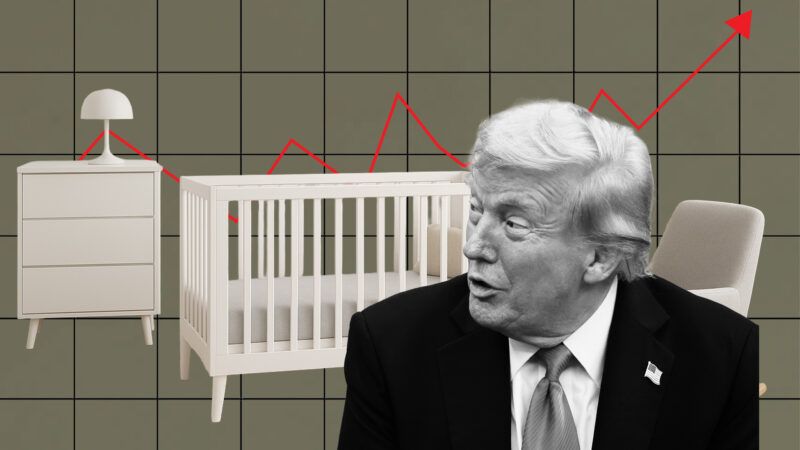Trump's Furniture Tariffs Will Make It Harder To Turn Your House Into a Home
Protectionism won't save the American furniture industry, but it will increase the cost of living.

President Donald Trump announced on Truth Social on Friday that his administration is "doing a major Tariff Investigation on Furniture coming into the United States." What exactly the president is investigating is unclear, but the consequence of hiking tariffs on imported furniture is higher prices for cribs, beds, tables, chairs, and all those things that make a house a home.
Trump's announcement comes nearly six months after his March 1 executive order calling for an investigation into the "Threat to National Security From Imports of Timber, Lumber, and Their Derivative Products," which the Commerce Department began on March 10. Trump elaborated that the furniture investigation will be completed in 50 days and that, at that time, "furniture coming from other Countries into the United States will be Tariffed at a Rate yet to be determined."
Reuters reports that the furniture tariffs "would be conducted under the Section 232 national security statute," which the president has used to levy a 50 percent duty on imported steel, aluminum, and derivative products. Whatever rate the Trump administration lands on, the Section 232 tariffs will replace the 10 percent baseline reciprocal tariff that importers have been paying since April 5.
The market appears to be anticipating that the eventual Section 232 tariff rate on foreign furniture will, like the 50 percent Section 232 rate on steel and aluminum products, be substantially greater than current reciprocal tariff rates. Wayfair, which imports many of its goods from China and Vietnam—which are subjected to 34 percent and 20 percent reciprocal tariff rates, respectively—had its stocks fall by 5.9 percent on Monday, according to Investor's Business Daily. The Wall Street Journal reports that tariffs "haven't greatly affected prices of the furniture [Wayfair] sells [because] it doesn't own much of the inventory sold through its website [and] isn't responsible for importing that inventory."
Trump's stated motivation for the investigation is to "bring the Furniture Business back to North Carolina, South Carolina, Michigan, and States all across the Union." The U.S. imported $25.5 billion in furniture in 2024, a 7 percent jump from the year before, according to FurnitureToday. But the data don't suggest that increased imports are responsible for a decline in American furniture making.
For many industries, manufacturing's share of total employment has steadily declined since the early 1950s, which Don Boudreaux, economics professor at George Mason University, tells Reason has little to do with trade. "[The North American Free Trade Agreement] comes along in 1994: no acceleration in the rate at which manufacturing employment as a share of total employment is falling; China gets most favorite nation trading status on a permanent basis [in May 2000]: no change; China joining the [World Trade Organization in December 2001]: no change."
But as manufacturing's share of total employment declined, its output jumped, reaching its peak in 2007. It's still "much, much higher today" than it was in the "alleged golden age" of the 70s, 80s, and 90s, Boudreaux explains. Furniture production mirrors this general trend, reaching its apex in February 2006 before declining precipitously during the Great Recession.
Meanwhile, the globalization of America's furniture supply chain has meant lower prices for consumers: The price of furniture in urban households steadily decreased following China's entry into the WTO until November 2017, according to data from the Bureau of Labor Statistics. And just like many other goods, the pandemic caused furniture prices to soar by 20 percent from February 2020 to April 2023. Prices plateaued between May 2023 and December 2024, but, since Trump took office in January, they have increased by over 3 percent—reaching a 58-year maximum in July.
Trump's furniture tariffs won't enhance national security; the U.S. doesn't need to produce desks to defend itself. What they will do is further increase the cost of imported furniture and the cost of living for Americans. To the extent furniture tariffs succeed in reversing the industry's downward trend, they will do so at the expense of American families and the misallocation of the country's resources to less productive uses.


Show Comments (18)